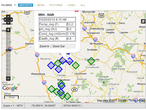The National Geospatial-Intelligence Agency (NGA) has a requirement to provide a secured, hosted environment that provides web-based access to geospatial visualization services and Open Geospatial Consortium complaint web service interfaces. The Schedule of Supplies/Services provides for the period of performance from 20 September 2010 through 19 September 2011 and two 12-month option years.
This acquisition is for Commercial Geospatial Visualization Services for NGA. Google is the only source that can meet the Government's requirement for worldwide access, unlimited processing, and Open Geospatial Consortium complaint web service interfaces. See Full National Geospatial-Intelligence Agency Release
|
“Do Not Track Me” gains traction in Washington
by John M. Simpson (Aug 15, 2010)
|

“What They Know” Series by the Wall Street Journal
|
A comment on the Google wi-fi/wi-spy issue:
“Most of my sources say that Google and Facebook have been bankrolled by the NSA and CIA vendors and they are in complete collusion with each other. I believe Americans will live to regret their participation with Facebook and Google.” –Glen Woodfin (source)
|
|
Related:
+ 2009 Arnold Google: The Digital Gutenberg (also: The Google Legacy, Google 2.0: The Calculating Predator)
+ Inside Google
+ Google = King of Malware
+ Journal: Google, CIA Invest in ‘Future’ of Web Monitoring
+ Street views privacy issue
+ Time For Google to Grow Up: Open Wi-Fi Privacy Mistake Must Be The Last (EFF.org)
+ Seriously? Eric Schmidt Thinks There Should Be No Anonymity Online? (Forbes – Aug 11, 2010)
+ EFF Warns of Untrustworthy SSL, Undetectable Surveillance (Aug 16, 2010)
+ Google CEO: Young web users will need to escape online posts (Aug 20, 2010)




